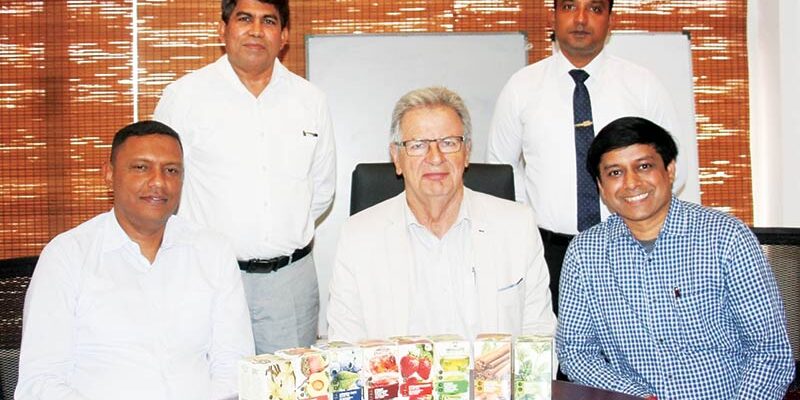Seated from left: Menaka Athukorala,CEO & MD HPL PLC, Gary Seaton ,Chairman G&G Group of Companies ,Singapore, Gowri Shankar, CEO G&G Group of Companies, Singapore. Standing from left: Waruna Fernando, Deputy CEO, HPL PLC, Nisal Rukshan , Assistant Manager Plantations and Leisure, HPL PLC.
Looking for opportunities to invest in tourism and solar power verticals Says ‘would be happy to talk to right partners’
By Sanath Nanayakkare
Getting a more realistic control over historical truth and the current significance of a company will probably be the prime concern of a potential investor looking for a strategic tie-up with a particular company, before he or she decides to invest in it.
In that context, Hatton Plantations may not have a ‘story’ to tell, but rather a ‘credible report’ to present because many investors might be cynical about listening to stories.
Hatton Plantations PLC is a subsidiary of G&G Group of Companies, a Singapore-based conglomerate whose chairman is Gary Seaton from Australia who first visited Sri Lanka in the 1970s as a backpacker tourist. Then he and his family started looking at business opportunities in Sri Lanka in the 1980s and bought the first tea company in 1996 after the plantations privatization programme came into effect in Sri Lanka. That was the well-known Pussellawa Plantations spanning across 10,000 hectares.
Then they sold it in 2017 and bought Hatton Plantations (HPL PLC) in 2019 which has 7,500 hectares on 13 estates.
Today HPL PLC has 12 tea processing factories with a combined green leaf capacity of 155,500 kg per day. It uses Orthodox, CTC, Leafy, and Green Tea manufacturing methods supported by versatile production facilities. It engages in the production of high and medium-grown teas in the key regions of Watawala, Hatton, and Lindula.
Hatton Plantations PLC, was the highest producer amongst all the Regional Plantation Companies (RPCs), having sold a quantity of 6,484,037.50 kgs with an average of Rs.1,134.11 for the year 2024, preceded by equal performances in the three previous years. And HP PLC is one company that has been replanting for the past four years continuously – a key factor that has contributed to its continuous growth.
Speaking to the media at the Company’s office in Peliyagoda recently, Gary Seaton said. “We have a vision to further expand into plantation, and we also look at two other business verticals: renewable energy and tourism. We very much believe in transitioning from fossil fuels to renewables. Sri Lanka is one of those few remaining countries that hasn’t industrialized everything and that’s very much aligned with the vision of Hatton Plantations PLC. We understand the challenges Sri Lanka faced in the last 40 years. But despite those challenges, we are with Sri Lankans. Many Sri Lankans are leaving Sri Lanka to go abroad, but we are coming from abroad to operate from Sri Lanka. We are doing it the other way around,” he said on a lighter note.
Menaka Athukorala, CEO & MD Hatton Plantations PLC said,” As part of the diversification, we are going into coffee in a major way. We initiated this project three years ago and we have already planted coffee on 100 hectares, and we are already harvesting coffee. A total of 500 hectares of coffee will be planted in the next 3 to 4 years. Our total investment in coffee would be Rs. 1 billion and we have already invested Rs. 200 million. With this, our per hectare income grows with the optimum use of the land while getting the best productivity from our workforce in a mutually beneficial way.” he said.
Gowri Shankar, CEO G&G Group of Companies, Singapore noted,” There’s a shortage of coffee in India, so it will be a potential market for our unique Sri Lankan coffee brand apart from the U.S., and Australia markets. South India loves coffee over tea and North India’s preferred beverage is tea. So, our coffee has a great opportunity to enter the South Indian market. Hence, we are looking at these three key markets for exporting our coffee.”
“Some other companies also have started growing coffee, but we are the largest producer of coffee at present. We will be setting up our coffee processing unit in the next two years which will cost about Rs. 200- 300 million. By 2026, HPL PLC’s coffee will come to the local market and exports will commence in 4 years down the line”, Menaka Athukorala said.
Touching on their tea plantations, HPL PLC said that they have started deploying mechanization, precision agriculture and tech solutions to make their operations more efficient.
HPL has already started using drone technology to apply Foliar Spray on some of their estates to deliver essential nutrients directly to the tea leaves.
“Drones are being used in pilot projects to streamline the operational process, to increase the productivity in the fields and to make the monitoring more efficient and automative,” they said.
“We are upgrading the facilities being provided to our field workforce with convenient access to toilets and bathing places. We have a workforce of 4,000 on permanent basis and an equal number on a casual basis. The issue of labour wages has not caused us much of a problem because we have so many welfare activities that ensure our workers’ well-being.”
“We are going to set up a vocational training institute on our estate in Hatton to train the children of our workers in various crafts. With the new-found skills, they can choose to work with us or go and be employed or self-employed elsewhere. We believe such socially responsible activities will foster stronger bonds between the company and the employees. That bond will take care of the whole ecosystem of Hatton Plantations for many years to come,” they said.
“For diversification in tourism, we are looking at strategic partnerships whose mainstream business is tourism. We don’t want to get into their line of business. As the infrastructure is already there with HPL’s holiday bungalows and picturesque tea estates, we will see who understands its value and bring their expertise of tourism to our assets. We will see how we can leverage those assets together with them and grow the business,” Gowri Shankar said.
Hatton Plantation PLC’s profit before tax was Rs. 1.2 billion in 2024. This year it will be slightly less because of the wage increase, and it is expected to be close to one billion rupees in FY 2024/25. And in FY 2025/26, the company expects a PBT of Rs. 1.3 billion when tech modernizations are successfully implemented.
“We have liquid cash assets that we would like to channel into these verticals. In the meantime, we are looking at the possibility of investing in tea plantation in Kenya as there is an opportunity to produce orthodox leafy teas in that country – where your yields are higher and profit margins are much greater,” they said.
The media was told that HPL was keen on investing in viable solar power projects anywhere in Sri Lanka that generates more than 5 megawatts of power.
Currently, HPL has eight hydro-power plants generating 12 megawatts. Lotus Hydro Power of the Group is the highest dividend-yielding company in the domain with around 14% yield rate, consistently maintaining it from 2014, except for the crisis-years in Sri Lanka.
“Hatton Plantations is willing to allocate Rs. 1 billion to invest in a viable solar project and we’d be happy to talk to the right partners”, “Gary Seaton said.







